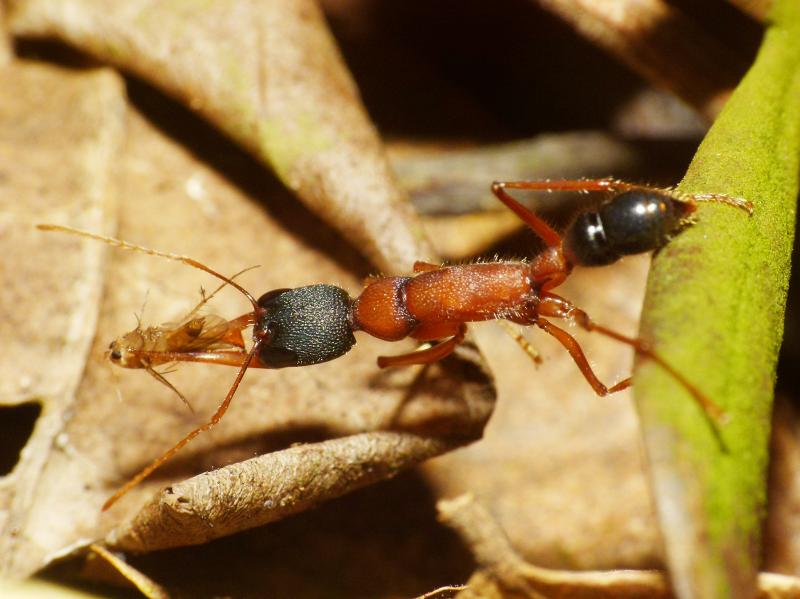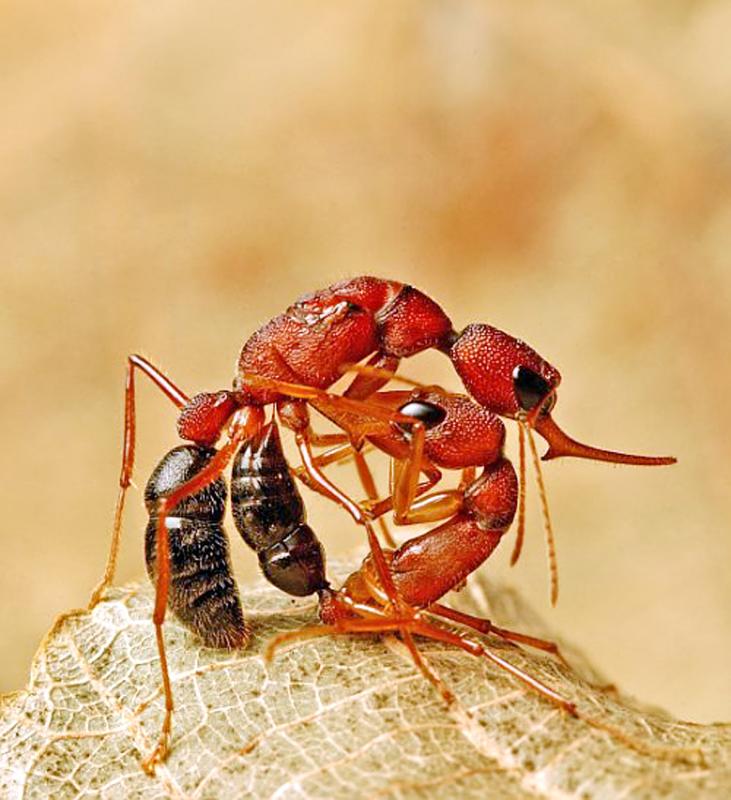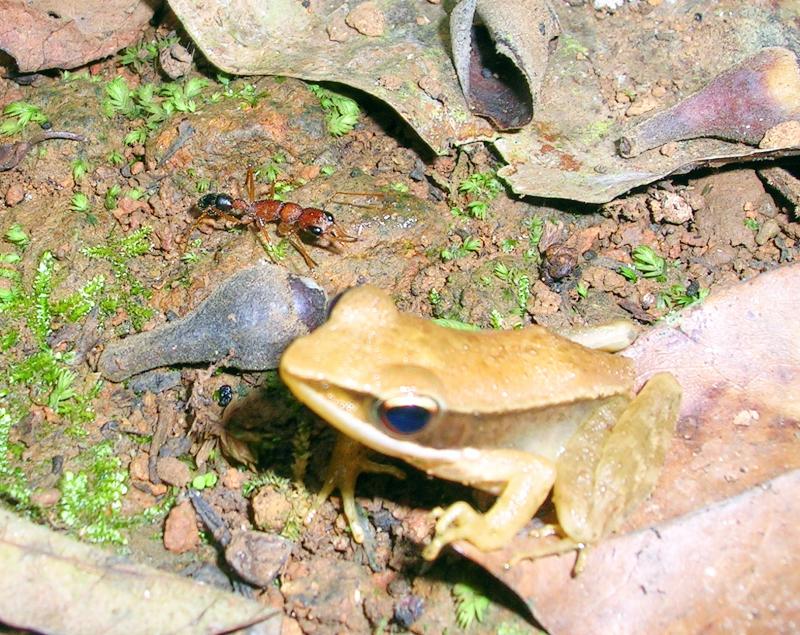Few species in the animal kingdom can change the size of their brain. Fewer still can change it back to its original size. Now researchers have found the first insect species with that ability: Indian jumping ants.
They are like catnip to researchers in the field. In contrast to their cousins, Indian jumping ants colonies do not perish once their queen dies. Instead, “chosen” workers take her place — with expanded ovaries and shrunken brains — to produce offspring. But, if a worker’s “pseudo-queen” status is somehow revoked, their bodies can bounce back, the research suggests.
Typically, whether an ant will be a worker or a queen is decided at the larval stage. If fed generously and given the right hormones, the ant has the chance to become a big queen. If not, then it is stuck with a career as a sterile worker deprived of the opportunity to switch — unless it’s part of a species such as the Indian jumping ant.

Photo courtesy of Wikimedia Commons
“They have this ability to completely transform themselves at the adult stage, and that makes them interesting to try to understand,” said lead author Clint Penick from US-based Kennesaw State University.
Social insects such as ants typically inhabit a caste-based society — the queen reigns as the sole reproducer by secreting pheromones that thwart female worker ants from laying eggs. The other ants work hard: foraging and hunting for food, cleaning, caring for the young and defending the nest.
But unlike typical colonies that wither away on the death of their queen, Indian jumping ant colonies are functionally immortal.

Photo courtesy of Wikimedia Commons
Within hours of the queen’s death, a frenzied “ritualized combat” commences, in which workers engage in fierce duels that involve jamming antennae into each other’s faces. While this tournament persists up to a month — the chosen workers are the multitaskers who can duel and activate their ovaries. These pseudo-queens — usually five to 10 in a colony of about 100 ants — then produce that pheromone that compels the rest to treat them like royalty. Eventually, these reproductive workers get on with the process of mating with their brothers, and prolonging the life of the colony.
The pseudo-queens (formally called gamergates — not be confused with the 2014 hashtag campaign ostensibly founded to protest about perceived ethical failures in games journalism) see their life-expectancy increase from about six months to up to five years. Their ovaries swell to five times in size filling up the entire abdomen, and their brain shrink by anywhere from 20 percent to 25 percent, which researchers suspect is a process designed to divert limited resources to egg production.
In this study, Penick and his team experimentally induced gamergates to return to their original normal worker status — to assess whether the physiological and behavioral changes were reversible, they wrote in the Royal Society’s journal Proceedings B.

Photo courtesy of Wikimedia Commons
Using a sample of 30 colonies, the researchers marked two mature reproductive workers from each colony. One from each pair was left to isolate for three to four weeks in a plastic box and fed periodically, while the other remained in its nest.
The researchers hypothesized that the lack of social interaction and care would reduce the isolated gamergate back to worker status when reintroduced to its former nest. Sure enough, within a day or two those gamergate’s were no longer producing eggs and over the course of several weeks they started displaying normal worker-like behavior, Penick said.
Roughly six to eight weeks later, Penick was left with the unenviable task of dissecting the small insects to check whether their internal organs had reverted to ordinary worker proportions — which they did.
“It opens up opportunities now to dig into the mechanisms that control whether a brain region grows or shrinks in size,” he said.

This is the year that the demographic crisis will begin to impact people’s lives. This will create pressures on treatment and hiring of foreigners. Regardless of whatever technological breakthroughs happen, the real value will come from digesting and productively applying existing technologies in new and creative ways. INTRODUCING BASIC SERVICES BREAKDOWNS At some point soon, we will begin to witness a breakdown in basic services. Initially, it will be limited and sporadic, but the frequency and newsworthiness of the incidents will only continue to accelerate dramatically in the coming years. Here in central Taiwan, many basic services are severely understaffed, and

Jan. 5 to Jan. 11 Of the more than 3,000km of sugar railway that once criss-crossed central and southern Taiwan, just 16.1km remain in operation today. By the time Dafydd Fell began photographing the network in earnest in 1994, it was already well past its heyday. The system had been significantly cut back, leaving behind abandoned stations, rusting rolling stock and crumbling facilities. This reduction continued during the five years of his documentation, adding urgency to his task. As passenger services had already ceased by then, Fell had to wait for the sugarcane harvest season each year, which typically ran from

It’s a good thing that 2025 is over. Yes, I fully expect we will look back on the year with nostalgia, once we have experienced this year and 2027. Traditionally at New Years much discourse is devoted to discussing what happened the previous year. Let’s have a look at what didn’t happen. Many bad things did not happen. The People’s Republic of China (PRC) did not attack Taiwan. We didn’t have a massive, destructive earthquake or drought. We didn’t have a major human pandemic. No widespread unemployment or other destructive social events. Nothing serious was done about Taiwan’s swelling birth rate catastrophe.

Words of the Year are not just interesting, they are telling. They are language and attitude barometers that measure what a country sees as important. The trending vocabulary around AI last year reveals a stark divergence in what each society notices and responds to the technological shift. For the Anglosphere it’s fatigue. For China it’s ambition. For Taiwan, it’s pragmatic vigilance. In Taiwan’s annual “representative character” vote, “recall” (罷) took the top spot with over 15,000 votes, followed closely by “scam” (詐). While “recall” speaks to the island’s partisan deadlock — a year defined by legislative recall campaigns and a public exhausted